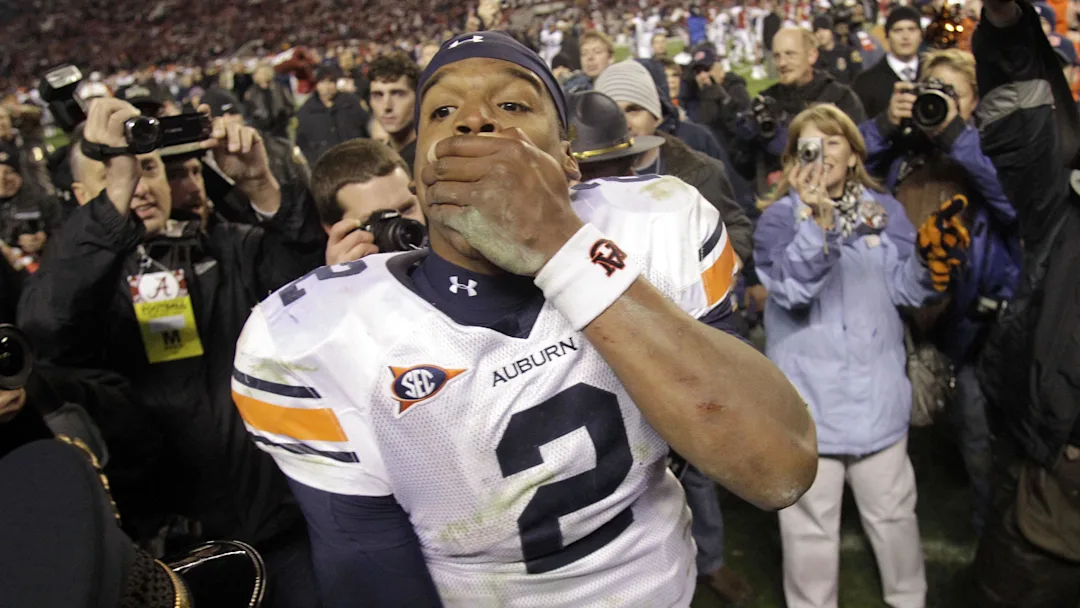There are games, and then there are moments that transcend the gridiron — moments that live forever in the hearts of fans, define programs, and become immortalized in the fabric of college football history. For Auburn Football, those moments haven’t just happened — they’ve been earned. Whether it’s through dramatic finishes, championship-defining wins, or jaw-dropping individual performances, the Tigers have left an undeniable imprint on the sport. Now, with multiple games named among the Top 25 of the Century, Auburn’s legacy is once again being celebrated — and rightly so.
Ask any Auburn fan where they were on November 30, 2013, and you’ll get a vivid answer. The “Kick Six” wasn’t just a game — it was a miracle. It was theater. It was destiny. In a century of unforgettable college football clashes, Auburn’s last-second 34-28 win over Alabama in the Iron Bowl stands alone as perhaps the most dramatic ending in college football history. With one second on the clock and Alabama lining up for a 57-yard field goal attempt, few could have imagined what was about to happen. Chris Davis, lined up deep in the end zone, caught the missed field goal and raced 109 yards to the opposite end zone. Jordan-Hare Stadium erupted. The world stood still — except for Davis, who kept running.
That game alone guaranteed Auburn a spot in the conversation of greatest games ever played, but it wasn’t the only one. Not by a long shot.
Just a week before the Kick Six, Auburn delivered another iconic moment when Ricardo Louis hauled in a 73-yard game-winning touchdown on a tipped pass against Georgia. It was dubbed “The Prayer at Jordan-Hare,” and it added another chapter to the 2013 team’s magical run. Together, those two games captured the essence of Auburn Football — grit, resilience, and the unshakeable belief that no game is ever over until the final whistle blows.
But Auburn’s legendary status in college football didn’t begin in 2013, nor does it end there. The Tigers have been part of era-defining games stretching back decades, each contributing to the aura and mystique of one of the sport’s most storied programs.
Take, for instance, the 2004 SEC Championship Game, when Auburn capped off a perfect regular season with a 38-28 victory over Tennessee. That team — led by the deadly offensive trio of Jason Campbell, Cadillac Williams, and Ronnie Brown — steamrolled through the SEC but was infamously left out of the BCS National Championship Game, sparking debates that continue to this day. While the snub still stings for some, the team’s dominance and the emotion behind that season laid the groundwork for Auburn’s resurgence as a national powerhouse.
Then there’s the 2010 season — a roller coaster of drama, dominance, and destiny. At the center of it all was Cam Newton, who delivered one of the most electrifying seasons in college football history. Newton’s individual brilliance, highlighted by jaw-dropping comebacks against Alabama and LSU, catapulted the Tigers into the BCS National Championship Game against Oregon. That game, a 22-19 win capped by Wes Byrum’s game-winning field goal as time expired, was physical, intense, and utterly unforgettable. The win secured Auburn’s first national title since 1957 and cemented Cam Newton’s place in Auburn lore.
It’s no surprise that the 2010 National Championship Game made the Top 25 list. It had everything — high stakes, elite talent, and a finish that had fans holding their breath until the very last second. It also represented the pinnacle of an incredible campaign and showcased Auburn’s ability to rise when the moment called for greatness.
These games don’t just stand alone as isolated classics — they are pieces of a broader legacy. What they reveal is a program built on courage under fire, excellence under pressure, and a passionate fan base that fuels every run, every hit, and every comeback. Auburn isn’t just a participant in college football’s greatest theater; it is often the main character.
That legacy is reflected in the sheer variety of games Auburn has been a part of that could reasonably be considered for inclusion on any list of the greatest. The 1982 victory over Alabama, which ended a nine-year losing streak in the Iron Bowl, was more than a win — it was a cultural reset. Bo Jackson soaring over the top for the game-winning score etched his name into Auburn history and became an image replayed for decades. The win not only revitalized the program, but it marked a new era for Auburn Football under Pat Dye — one where the Tigers would not be intimidated, not even by the mighty Crimson Tide.
Even in heartbreak, Auburn has produced games that remain part of the national memory. The 2005 thriller against LSU, in which Auburn missed five field goals in a 20-17 overtime loss, remains etched in fans’ minds for its agony, yes, but also for its intensity and stakes. Games like that prove how fine the line can be between heartbreak and heroism — and how Auburn has experienced both on the grandest stages.
More recently, Auburn’s 2017 win over No. 1 Georgia followed by a blowout of then-No. 1 Alabama just two weeks later created a buzz that few programs can replicate. While the Tigers fell short in the SEC Championship rematch against Georgia, the run underscored Auburn’s ability to spoil seasons, shift narratives, and compete with the very best when it matters most.
The Top 25 Games of the Century list isn’t just about who won or lost — it’s about the feeling a game leaves behind. It’s about unforgettable atmospheres, jaw-dropping plays, and storylines that capture the nation’s attention. It’s about the chills you feel every time you hear the words “Kick Six.” It’s about the 2010 title game, where destiny and dominance collided under the Arizona night sky. It’s about the spark in every Auburn fan’s eye when reliving the Prayer at Jordan-Hare, or the burst of adrenaline from watching Cam Newton drag defenders like rag dolls on his way to the end zone.
These games are historical documents in motion — and Auburn is all over them.
What makes Auburn’s presence on the list so meaningful isn’t just the number of games included — it’s the range of emotion, context, and consequence they embody. From miraculous finishes to championship glory to redemption arcs decades in the making, these moments tell the story of a program that doesn’t just play football, but lives it. Auburn’s highs have been as high as the sport offers, and its fans have ridden every wave with pride, passion, and unyielding support.
For a program to consistently deliver moments worthy of the title “Game of the Century,” it takes more than talent. It takes heart. It takes belief. And it takes a tradition that teaches every player who wears the uniform what it means to represent something bigger than themselves.
At Auburn, that tradition is alive and well. It’s in the Tiger Walk, where fans reach out to touch the future. It’s in the roar of Jordan-Hare Stadium, a sound so powerful it can bend destiny. It’s in the memories of games gone by and the promise of new legends to come.
Auburn doesn’t chase greatness. It lives it.
So as the Top 25 Games of the Century are remembered, replayed, and revered, one truth stands tall: Auburn Football doesn’t just belong on that list — it defines it.
Legends live here. Always have. Always will.



